John Janaro's Blog, page 109
December 3, 2020
Missionary Saints: Poor Beggars Driven By Love
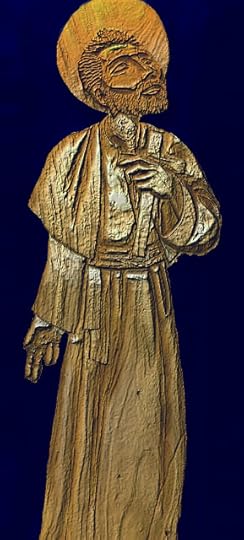 Today we honor the great pioneering Jesuit missionary Saint Francis de Sales. He is remembered, of course, for his tremendous passion for the gospel, and for the way that the love of Jesus drove him to "the ends of the earth." Francis took the risks of traveling great distances, often under conditions so appalling that we cannot imagine them, to bring Jesus to the peoples of South and East Asia: ancient peoples with long histories and religious traditions of their own.
Today we honor the great pioneering Jesuit missionary Saint Francis de Sales. He is remembered, of course, for his tremendous passion for the gospel, and for the way that the love of Jesus drove him to "the ends of the earth." Francis took the risks of traveling great distances, often under conditions so appalling that we cannot imagine them, to bring Jesus to the peoples of South and East Asia: ancient peoples with long histories and religious traditions of their own.But Francis didn't pour out his life to be a cultural imperialist. He didn't go to Asia to force "Western Religion" down the throats of "inferior peoples."
There were plenty of cultural (and economic and political) imperialists who would come from the West in the ensuing centuries, to impose their structures and modalities of life in Asia. Their legacy endures today: some positive and constructive elements have been integrated into post-colonial Asian societies, but much remains ambivalent and problematic, and much has caused, or exacerbated, division and violence.
Generally speaking, the agents of 16th to 20th century global imperialism stand out because they were rich. Or at least, they became rich. They came to Asia to make money off the Asian peoples (even if it meant turning them into drug addicts, as happened in 19th century China).
Francis de Sales went to Asia out of love. He wanted people to know the unfathomable riches of the love of God. Evangelization is not "proselytism" (as we understand the term today) — it has nothing to do with coercing or manipulating people to "join your group" so that you can exercise power over them. It has to do with revealing and embodying God's love for people. This means that genuine evangelization doesn't intentionally go against anything that God has already done in the hearts of people by the mysterious workings of his grace. It doesn't endeavor to belittle or despise any of the immense depths of truth, goodness, and beauty that people in non-Christian cultures have discovered — the diverse facets of the richness of existence they have perceived and developed — in their lives, through their traditions, and as the fruit of their splendid efforts to seek the meaning of life and to respond, mysteriously, in their own hearts to grace of the Holy Spirit. Authentic evangelization opposes only evil and sin. It brings freedom from the destructiveness of sin by the gift of God's love. It promises the fulfillment and transformation of every good thing, and the flourishing of human persons and cultures in their whole truth.
Christian missions didn't always live up to the task of evangelization. Sometimes, they were distorted by elements of false proselytism (especially to the extent that they were "sponsored" by "enthusiastic" people-in-power whose main interest was to establish new ways of enriching themselves). To a significant extent, the history of the first real Globalization Project recounts a series of complex, daring enterprises by Western Europeans who had various motivations for their efforts to "spread the benefits of civilization." Even as Europe's own identity (which was rooted in an imperfect but real inculturation of Christian faith) was breaking down into warring factions, Europeans tried to take up this global project of unifying the whole world. Western powers were fighting with one another for dominance in Europe. Not surprisingly, they also fought over who would get which piece of the global pie.
Christian missionaries, including some saints, accompanied or followed (and occasionally even preceded) the expansive efforts of these temporal forces. Many missionaries endeavored heroically to preach the gospel and bring new peoples to an encounter with Jesus Christ. But Christian missionaries were human; their understanding was limited and their motivations could be ambivalent; even more ambivalence was to be found in the political forces that tried to control missionary activity.
We must not, however, make the mistake of judging the whole project to be an irredeemable as absolute villians. The European powers had much to give, to share, and to help build up for the benefit of the whole world. But their motives were inevitably mixed. They wanted to exercise their power for what they thought was "the good" of people, but they also wanted to accumulate power and seek their own glorification. They wanted to open up trade and cultural and economic exchange but they also wanted to be the ones to dominate the process. They even wanted people to come to know Christ, and they told themselves that this more than compensated for the fact that they also wanted to make a ton of money. Too often they deluded themselves into thinking they could "serve two masters" — God and mammon. Thus, genuine achievements were inevitably compromised in some respects, and many evils were perpetrated and condoned under the cover of hypocrisy. This is the inevitable result when Christians think they can do God's will and indulge their own covetousness at the same time.
Francis de Sales had no such ambiguous and divided aspirations. He burned with an unquenchable thirst for God, and to bring others to the joy of knowing the love of God through Jesus Christ. This was his whole focus. He was a lover; all his wealth consisted in belonging to Christ and serving his brothers and sisters. He lived poor. He begged for whatever means he could get to share the love of Christ. And though he evangelized many in India, and began the mission to Japan (that would flourish only for a short time), he was never satisfied. He spent himself entirely in this witness, and he died in 1552 on Sangchaun island, at the threshold of China, trying until the very end to begin an unprecedented evangelization of this immense country and its exceptional people.
Francis died poor and alone. And after nearly five centuries, the great mission to China has barely begun. We know that God works in peoples' hearts, but we also know that God became incarnate so that every person could see his face and know his love in the communion of the Church. Real missionaries know that God wants to reach people and give himself to people through Jesus. They belong to Jesus, and seek to "extend" the presence of Jesus to every place.
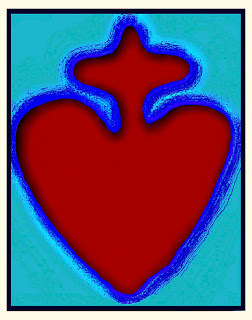 Real evangelization is not about power, exploitation, asserting one's own superiority, or amassing wealth. It's about love. It follows the "law of love." It dares things that might seem futile to unloving eyes.
Real evangelization is not about power, exploitation, asserting one's own superiority, or amassing wealth. It's about love. It follows the "law of love." It dares things that might seem futile to unloving eyes.This brings to mind another great missionary, a "pioneering" missionary who is a special witness for our time, for the beginning of the new evangelization: Blessed Charles de Foucauld (1858-1916), who we celebrated on December 1. Charles, the "little brother of Jesus," devoted the final years of his life to living with and serving the poorest of the poor among the nomadic peoples of the Western Sahara (in what is now Algeria).
He was no agent of 19th century French imperialism. He died poor and alone, in the desert, without great achievements, without success — not even any (apparent) success at "being a missionary." He was Christ's beating heart in one small place in the world, Christ loving those who are forgotten by everyone else.
"Let us concern ourselves with those who lack everything, ...those to whom no one gives a thought. Let us be the friends of those who have no friends, their brother. The love of God, the love of men, that is my whole life, that will be my whole life, I hope. When we can suffer and love, we can do much, the most that one can do in this world" (Blessed Charles de Foucauld).
December 1, 2020
The Last Leaves Of November (Photos and Art)
Here is a good way to begin December: by saying "goodbye" to November!
Some of these photos and/or digital artworks have been posted to Instagram but others are appearing here for the first time. But in any case this is a good sample of the scenery of this very pleasant November (at least in terms of the weather).
Most of the leaves have... well... "left" by now. (Ha, you see what I did there?
November 29, 2020
Dorothy Day's "Politics of Mercy"
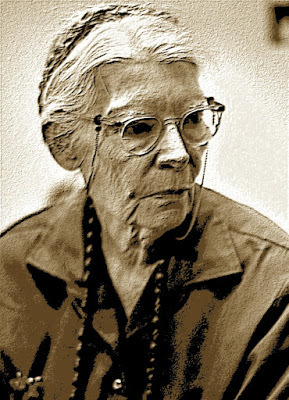 Forty years ago, on November 29, 1980, Dorothy Day came to the end of her very "unconventional" earthly pilgrimage. As we begin the season of Advent, we also remember this significant anniversary of her death. Those of us who live in the United States of America can benefit especially from reflecting on the foundations of her perspective on human society.
Forty years ago, on November 29, 1980, Dorothy Day came to the end of her very "unconventional" earthly pilgrimage. As we begin the season of Advent, we also remember this significant anniversary of her death. Those of us who live in the United States of America can benefit especially from reflecting on the foundations of her perspective on human society.During her long life, the founder of the Catholic Worker devoted herself to the practice of the works of mercy on the margins of an American cultural environment that many of us today look back on with nostalgia. We see it as a time of innocence and decency.
She didn't.Dorothy Day was deeply critical of USA society in the 1930s, 40s, and 50s (and then, of course, the 1960s and 70s too) in ways that are often beguiling to both "conservatives" and "liberals" in this country. Her passionate convictions defy all the standard classifications.
Some of us would like to see Dorothy beatified for her heroic work with the poor, while setting aside her judgments about the society around her as naive and idiosyncratic. "Saints can be wrong, or not well informed. They are not infallible," we say.
Fair enough. I certainly wouldn't argue that all her particular judgments were correct, or that all the causes she supported upheld justice the way she thought they did. What interests me is the position from which she looked at secular society. Her judgment on society flowed from her concrete adherence to the Person of Jesus Christ in the Church, especially His presence among the poor.
She was thus neither a "right winger" nor a "left winger." Nor is it sufficient to explain her views by saying she was "liberal" on economic and social justice and "conservative" on liturgy, sexual morality, and fidelity to Church teaching.
What must be said is that she judged the society of her time (even in its political structures) from her experience of belonging to Christ in the Church. She was radical in the sense that her whole life came from "the roots," from the Person of Jesus in the communion of the Church.
She transcended the dialectic of the "leftist ideology" and "rightist ideology" that constantly battled against each other and fed off each other. Her politics was what Brent Bozell the elder called "the Politics of Mercy."
This "politics of mercy" is based on respect and love for the human person created by God and redeemed by Christ, the human person whom Christ identifies with himself--"You did it to me." It involves the work of building a community of persons, building the relationships of love that bring persons to their fulfillment and that can also really shape the structures of social and even economic interaction.
Building a real community of real human persons whose dignity is fully valued is the hardest thing in the world. And even though we must begin with people "wherever they are," acknowledge them as our brothers and sisters, and respect the real mystery of how and where God is working in their lives, we know that this community is impossible without Jesus Christ.
Dorothy Day had a vivid awareness of this fact. Jesus is truly the One who calls each human being to his or her destiny and who brings us together on a common road in this world, a place where day by day we journey toward him whether we know it or not.
Practical arrangements, dialogue, respect for freedom, inclusiveness... all of these are important. Still, Dorothy Day's witness calls us Christians to recognize that Jesus Christ is at the heart of all of our actions on behalf of society. It is the experience of being loved by Jesus that opens us up to loving others and to serving them concretely, in works of mercy, all of which tend toward the communion of persons.
Love does not coerce anyone. It trusts, rather, in the Infinite Love of God who works in the very depths of the freedom of every person. Christians are called to bear witness to this Love through solidarity and humble service to every person, especially those in need.
Love is patient. Love is kind. Love is not jealous or boastful, arrogant or rude or resentful. Love does not insist on its own way. It does not rejoice in wrong, but rejoices in the right. Love bears all things, hopes all things, believes all things, endures all things. (see 1 Corinthians 13:4-7)
This is what is at the heart of the "politics" of Dorothy Day. The more we enter into this heart, the more we realize the profound inadequacy of the twentieth century secular world and its powers in their attempts to propose (and impose) human community.
In the 40 years since her death, we have seen great developments of resources and technology and a vast global communications network, opening new possibilities for so many good things. Nevertheless, the essential drama has only intensified. All of this power remains in our human hands, expressing the deep ambivalence of our souls, accomplishing much good but also amplifying the division between our aspirations and our selfishness, and deepening our alienation from one another.
Dorothy Day's criteria for judgment are more relevant than ever. Today, our society continues to lose its increasingly thin veneer of ritual civility, and shows itself more and more to be openly brutal, factional, and violent. We are beginning to discover that the most meaningful "political" posture for a Christian is a radical loving adherence to Jesus and a compassion that serves Him in every person who is suffering.
We will find that Dorothy Day has much to teach us about this adherence and this compassion, about the practice of the politics of mercy.
November 27, 2020
Thanksgiving in 2020: A Good Meal and a Kangaroo Too
There's not much to show from Thanksgiving, since the people I hang out with are just too cool to be photographed for the Old Man's blog. But we had a "greetings post" (bottom picture) and we had food! It was a lovely day, and I was reminded of how much there is to be grateful for.
Our gathering was just the four daughters and Uncle Walter. John Paul and Emily were at her family's house, and we got some "facetime" with them as well.
I suppose we bent the recommendations a little, but I think we're inside the reasonable limits. Everyone was what you could call a "regular" in the house. We ate all the usual (and delicious) Thankgiving fare, with the exception of the world's most popular Australian wine.
The family name of the owners of the winery is "Casella" and they are immigrants from Catania... just like my grandfather on my mother's side, Giovanni ("John") Casella. Perhaps these Australians are famiglia! In any case, they make a nice table wine.
November 25, 2020
Diego Maradona: The Genius of "The Beautiful Game"
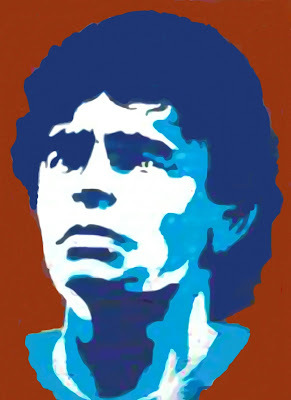 Argentine soccer legend Diego Maradona passed away from heart failure in his home in Greater Buenos Aires on November 25, less than a month after his 60th birthday.
Argentine soccer legend Diego Maradona passed away from heart failure in his home in Greater Buenos Aires on November 25, less than a month after his 60th birthday.I found out when I went to the webpage of the Italian newspaper Corriere Della Sera, in search of an article on a totally unrelated topic. The front page was covered with Maradona, above all that unforgettable image of his young face kissing the 1986 World Cup trophy.
"Ciao Diego, sei il calcio" the banner headline read. "Goodbye Diego, you ARE soccer" is the English equivalent. Note that this was an Italian newspaper eulogizing the star who was born thousands of miles and an ocean away in Latin America, and grew up in a poor, overcrowded barrio outside the city of Buenos Aires.
While his mother did come from Italian immigrants, his father was from the indigenous South American Guarani people (and Maradona was subjected to racist epithets from crowds and sometimes opposing players at various times in his career). But he played his best years of soccer in Italy's top professional league, leading Napoli from last place to two league championships and a UEFA Cup during the 1980s. His greatness on the pitch inspired a generation of fans and future players in both Italy and Argentina.
Nevertheless, his death — though it came as a surprise in the moment — was not, overall, something that was unexpected. In fact, Maradona had been suffering from many health problems, and had just returned from the hospital, where earlier this month he had surgery to remove a blood clot near his brain. His specific illnesses compounded the fact that his body was chronically, systemically exhausted. In a way it was a kind of "feat" that he made it as far as age 60, and no doubt he pushed himself all the way to the end.
In those 60 years, Maradona drove his body relentlessly, in ways that were beyond the limits of ordinary human endurance. In this time of mourning, we all prefer to look at the more admirable features of that drive: all the hard work, the training, the honing of his unique gifts, his explosive energy combined with brilliant ball control and unparalleled dribbling skills that outwitted his opponents again and again. For a dozen years he ruled the pitch in Argentina, Italy, and — in 1986 — the world. His amazing abilities, combined with his thorough intelligence of the game, made for a breathtaking spectacle, and brought a level of greatness to the 5'5" (168 cm) midfielder that goes beyond anything that can be measured by statistics.
His second goal against England in the 1986 World Cup quarterfinal made history for its speed and ball-control artistry and for the sheer genius by which he designed a path down the field, and then dribbled, feinted, fooled, and powered past five different (hopelessly burned) English players and then the goalie. This goal is widely considered to be the greatest in World Cup history. Five minutes earlier, Maradona's first goal in that quarterfinal displayed a different and more controversial facet of his "genius." As opportunity presented itself in rapid play in front of the English net, he flipped his head toward the ball while simultaneously punching it into the goal. There was nothing like on-the-field "replay review" in 1986, and the referee called it a good goal. Today the goal would have been challenged and overruled by the replay, which even in 1986 showed the involvement of Maradona's hand. All he said to reporters at the time, however, was that he hit it with his head and it must have been helped by "the hand of God." The notorious "Hand of God" goal seems more widely known in soccer mythology than the unparalleled moment of football perfection that scored the second goal 5 minutes later.
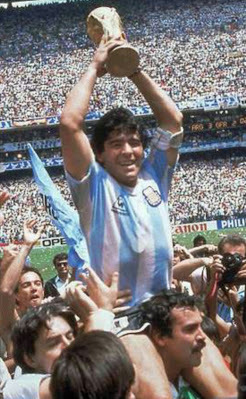 During this period, Maradona was living a mythical life on many levels. Enormous stress came with his dedication to the perfection of his sport and his achievements as World Cup hero in Argentina and "Savior of Napoli" in the fiercely competitive Italian league.
During this period, Maradona was living a mythical life on many levels. Enormous stress came with his dedication to the perfection of his sport and his achievements as World Cup hero in Argentina and "Savior of Napoli" in the fiercely competitive Italian league. This stress weighed heavily on him, and he tried to "live up to" its strange intensity in other aspects of his life.
As noted above, Maradona was a driven man, but unfortunately too much of his drive was invested in an effort to be a "larger-than-life" man. He had attained an excessive stature as a celebrity during these years, and Naples — with all its natural beauty, expressive personality, and blissful chaos — was also a place of boundless excess in all manner of indulgence for those who could afford it. Off the pitch, Maradona drove his body harshly, with a wild lifestyle fueled by enormous quantities of cocaine and alcohol.
It's hard to say whether his glory years as a soccer player would have lasted longer were it not for his cocaine addiction. He was nearly 31 years old when he failed a drug test and was suspended from professional play for a year. Meanwhile, Naples grew tired of its "savior" — and this happens to every star and every celebrity no matter where they achieve their fame. Neapolitans are just louder and maybe a little more capricious about it
November 24, 2020
November 24: The Martyrs of Vietnam

[Image from Vietnamese Martyrs Church, Phoenix, Arizona.]
"Blessed are they who are persecuted for the sake of righteousness, for theirs is the Kingdom of Heaven" (Matthew 5:10).
Today we honor the 117 Vietnamese martyrs of the 18th and 19th centuries whose stories have been sufficiently documented. Some died after enduring extensive gruesome, inhuman torture.
Saint Paul Le-Bao Tinh wrote: "In the midst of these torments, which usually terrify others, I am, by the grace of God, full of joy and gladness, because I am not alone — Christ is with me."
Collect Prayer:O God, source and origin of all fatherhood,
who kept the Martyrs Saint Andrew Ďung-Lacand his companions
faithful to the Cross of your Son,
even to the shedding of their blood,
grant, through their intercession,
that, spreading your love among our brothers and sisters,
we may be your children both in name and in truth.
Through our Lord Jesus Christ, your Son,
who lives and reigns with you in the unity of the Holy Spirit,
one God, for ever and ever.
November 23, 2020
COVID, the Holidays, and My Identity Crisis
November 22, 2020
Christ the King of Love
Jesus Christ is God-with-us, God who pours Himself out in love, who overcomes sin and death, who renews all things in His victory, who reveals the Mystery of God as the Mystery of Infinite Love. God loves us immensely. Jesus Christ is King because He loves us, and because His forgiving, healing, transforming love is our hope, and the hope of world.

November 20, 2020
Is the Hard Work of "Writing" Still Worthwhile?
 If you're a writer, you probably wonder sometimes why you bother doing it. Are you making any difference? How do you know whether you are succeeding at this all-too-often ponderous task?
If you're a writer, you probably wonder sometimes why you bother doing it. Are you making any difference? How do you know whether you are succeeding at this all-too-often ponderous task?Every writer feels frustrated at certain times. Writers who invest themselves within the subject matter of their writing are particularly vulnerable to disappointment. Most of what is regarded as literature (as opposed to instructional manuals, technical writing, or purely factual conveyance of information) involves to some extent this kind of "self-communication."
How does one "succeed" in this kind of writing?
That's a difficult question, which we can only approach in a limited way in this space. It's a question, nevertheless, that often occurs to writers. Perhaps you are a discouraged writer. You know you have something to say, not just to provide information but also to give a perspective that you have developed from your own engagement of life. You verify the objective facts about your subject matter (in accordance with the requirements of whatever kind of writing you are doing). You communicate your own personal experience honestly and openly, while also striving to learn from it and help others to learn along with you. You work very hard at it. But no one seems to be listening (or reading). You feel like a failure.
But the most important and profound success for a writer can't really be measured. It's qualitative rather than quantitative. It is ulitmately personal; indeed it entails in a radical sense the aspiration for person-to-person communication.
Here, however, it can be hard to perceive any kind of clear and accurate "results." Often other people don't recognize right away the value of what might just be a seed planted in their hearts, a small adjustment to the way they look at reality. Of course, the desire to write and to communicate feels the need for response - so we have comments boxes, email, live presentations (perhaps), personal conversations, correspondence, and other possibilities for interacting with readers. Such interaction can be fruitful and helpful, but it doesn't exhaust the desire to communicate that continually motivates the writer's work. The "satisfaction" of success is not found here.
Even writers who receive lots of positive "feedback," appreciation, good reviews, or even awards and fame will find that none of these things are adequate. Indeed, the most enthusiastic and sympathetic readers - who perceive more of what the writer wants to convey (and/or communicate more appreciation for it) - still leave the writer somewhat "dissatisfied." There is a "gap" that remains between the writer's investment of themselves in communicating and the limits of what is understood. Being misinterpreted goes beyond this gap and brings real frustration to any serious writer.
Whether in essays or art, prose or poetry, writing proves to be a long and difficult labor that we nevertheless undertake because its value is beyond immediate "measurable returns." Even if we consider that what we are trying to express may be more important as a contribution to the awareness of future generations, this remains an aspiration beyond our control, and one that underscores the "loneliness" of our efforts here and now.
The fundamental value of what we're doing, however, is in the truth and worth as such of what we have expressed. The thing that keeps us going, that brings us back to writing and keeps us writing through thick and thin, is the truth of what we are trying to communicate (even, indeed especially, when it's that particularly-difficult-to-articulate "truth about ourselves and our perspective on reality," drawn from personal experience).
That is our task in writing reflections and sharing our own experience. To communicate even a drop of that truth we thereby perceive (in spite of its being mixed in with our vanity, our incoherence, our stylistic idiosyncrasies, and all our other personal limitations) is what makes it worthwhile.
The heart of what we do is something that belongs in the category of witness. Other aspects - like finding the right platforms to promote our writing, expanding our readership, and seeing some level of impact - certainly have their place in our concerns. We want to communicate with other people, so obviously we want more people to read what we're writing, benefit from it, and appreciate it. It's only natural to want these things, and to feel disappointed when they seem to be lacking.
The overabundance of statistics available today don't necessarily give us a picture of the real value of our writing. Electronic media platforms tend to further enhance the distortion that reduces all forms of communication to the status of transactions involving the production and consumption of information. We can't give these things too much weight. We give the "production issues" whatever attention we can, without excessive anxiety, and get help from people who know better the "business side" of things.
What matters most, however, is for us to push through any feelings of failure that will inevitably come at times from this often "dry" (and at present rather unfashionable) task, and to keep writing, to keep offering and sharing who we are and what we have to say. People will receive it and it will have an impact on them. We don't have complete control over how that happens, but the ultimate value of our literary efforts as such is not found in external measurements of success but in our own "witness," in being faithful to setting it forth and expressing it as best as we can.





